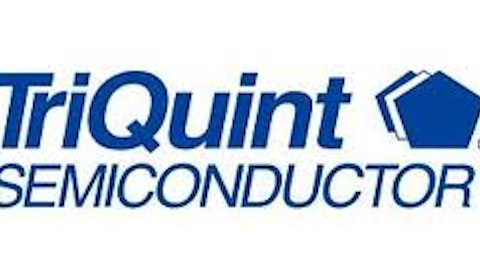Over the past couple of years, Samsung has risen to become a major force in mobile computing. While the South Korean conglomerate has long enjoyed advantages in vertical integration thanks to its wide range of component businesses, there has always been one area that Samsung hasn’t taken to the next level… until now.
Samsung now wants to make custom ARM Holdings plc (ADR) (NASDAQ:ARMH)-compatible chips.
The vast majority of ARM Holdings plc (ADR) (NASDAQ:ARMH)-based chip makers license specific core designs from the British company, and then implement them in various forms. All of Samsung’s Exynos chips to date have included these types of processing cores. ARM also sells optimized versions of these designs, which simplifies implementation.
In contrast, the most complex chip makers will use an architecture license, which allows companies to create custom processors that are compatible with the ARM Holdings plc (ADR) (NASDAQ:ARMH) ecosystem. It’s a much more sophisticated strategy that requires a lot of time and money to develop, but the end result is a chip that has better performance and power efficiency.

QUALCOMM, Inc. (NASDAQ:QCOM) and Apple Inc. (NASDAQ:AAPL) are the most prominent players to use this type of license. In total, only 15 companies have architecture licenses. QUALCOMM, Inc. (NASDAQ:QCOM) has been using its custom Krait cores for years; Apple’s newest A6 uses a custom Swift core, which is Apple Inc. (NASDAQ:AAPL)’s first implementation of its architecture license.
ETNews is reporting that Samsung is now pursuing its own architecture platform for its next generation of Exynos chips, a first for the South Korean giant. Samsung inked an architecture license with ARM several years ago, and has been developing custom chips ever since. The company had also reportedly been running into some challenges implementing ARM’s big.LITTLE configuration in its Exynos 5 Octa that powers the Galaxy S4. Samsung is hoping to complete development of these processors by early next year in order to power the next flagship smartphone.
If Samsung takes its chip game to the next level, there would be implications for ARM, QUALCOMM, Inc. (NASDAQ:QCOM), and Apple Inc. (NASDAQ:AAPL). First off, architecture licenses carry higher licensing fees for ARM, so Samsung’s continued use of its license would ensure recurring revenue in addition to per-chip royalties.
To the extent that Samsung can bolster its chip prowess, it could potentially source fewer chips from QUALCOMM, Inc. (NASDAQ:QCOM). However, one of QUALCOMM, Inc. (NASDAQ:QCOM)’s primary strengths is cellular integration, and Samsung would need to focus development there as well if it wants to buy fewer Snapdragons.
For Apple Inc. (NASDAQ:AAPL), any performance gains that Samsung can realize would further intensify the competition between the two companies. Apple Inc. (NASDAQ:AAPL) appears to be interested in integrating connectivity as well, but mostly with short-range communications. Samsung has learned a lot about making mobile A-chips for Apple Inc. (NASDAQ:AAPL), and the company may be preparing to emulate its rival again.
The article How Samsung Wants to Be Like Qualcomm and Apple originally appeared on Fool.com is written by Evan Niu, CFA.
Fool contributor Evan Niu, CFA, owns shares of Apple and Qualcomm. The Motley Fool recommends Apple. The Motley Fool owns shares of Apple and Qualcomm.
Copyright © 1995 – 2013 The Motley Fool, LLC. All rights reserved. The Motley Fool has a disclosure policy.





